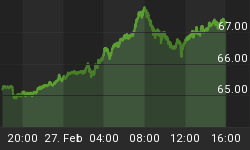Just yesterday, Henry Paulson's "bailout" bill, with only a few anti-Wall Street, pro-Main Street fig leaves slapped on by Democrats, appeared ready to sail through Congress on a bi-partisan tide. But something funny happened on the way to the printing press. It appears as if some conservative House Republicans are reluctant to sell their souls and ditch any remaining pretense towards American-style capitalism.
What's left of the Barry Goldwater wing of the Republican Party, which maintains its natural tendency to trust the markets and not government, has dug in its heels. But, Bush, Paulson and the Democrats have argued that our problems are so dire that free enterprise principles must go out the window. The struggle is historic, but the Congressmen are fighting a losing battle. Sadly, Americans now appear willing to abandon their economic heritage at the first sting of financial pain.
Although passage does seem inevitable, it is nevertheless the wrong thing to do. Central government planning did not work in the Soviet Union and it will not work here. Only free market forces are capable of sorting through the mess. Political meddling will make the problems worse.
In selling the bill to Americans, many are pointing to the Resolution Trust Corporation as an example of similar intervention that worked in the past. However, there is no proof that RTC actually helped as we have no way of knowing what might have happened had the government stayed out.
Missing in this discussion is that the Savings & Loan crisis of the 1980's, much like the current crisis, was a byproduct of government interference in the free market. By insuring bank deposits through the FDIC, the government created a moral hazard that resulted in extreme risk taking among member banks, whose depositors sought only high yields, without any regard for the risks that the banks were incurring. Banks that refused to take big risks lost deposits to those banks that did. Absent FDIC insurance, depositors would have considered risks as well as rewards, and the S & L crisis never would have happened in the first place!
The urgency for passing this bailout bill is based on the claim that the American economy will collapse if nothing is done. If the government were to stay out, and allow the market to function, there will certainly be a great deal of economic pain. Companies will go bankrupt, banks will fail, real estate and stock prices will keep falling, and many people will lose their jobs. However, government action will not prevent any of this. At best, it will merely delay the inevitable, but only at the cost of increasing the severity of the underlying problems, thus making their ultimate resolution that much more painful to endure.
The bottom line is that there is no way to resolve our economic problems without a severe recession, and our politicians need to level with the public. As a nation, we gambled on the alluring riches of real estate and we lost. The price must be paid. Contrary to the Bush Administration rhetoric, the fundamentals of our economy are not sound. If they were, we would not be in this mess. Recessions are meant to restore balance, purge excess, and liquidate mal-investments. On that score we have a lot of work to do.
We are being told that this plan will help the economy by keeping the spigots of consumer credit flowing. However, to really address the fundamental problems, those spigots must be tightened. Since we have already borrowed and spent ourselves into bankruptcy, the last thing we need is for consumers to borrow more.
Our leaders maintain that without this bailout consumers will not be able to borrow money to buy cars. So what is wrong with that? We already have plenty of cars, and if we are broke, why do we need to buy more? Instead, we need drive our old cars longer, pay off our underwater auto loans, and produce more cars for export. It is also argued that without access to credit parents will not be able to borrow money to send their kids to school. That's fine by me as it will force Universities to reduce tuitions to levels families can actually afford. They will either have to cut out all of that bureaucratic fat, or go out of business for lack of customers.
In the end it is impossible for the American economy to be rebuilt on a sounder foundation of savings and production without a lot of economic pain. Government efforts to reinforce the shaky foundation of borrowing and consuming will result in the entire structure falling down around us.
For a more in depth analysis of our financial problems and the inherent dangers they pose for the U.S. economy and U.S. dollar denominated investments, read Peter Schiff's book "Crash Proof: How to Profit from the Coming Economic Collapse." Click here to order a copy today.
More importantly, don't wait for reality to set in. Protect your wealth and preserve your purchasing power before it's too late. Discover the best way to buy gold at www.goldyoucanfold.com. Download my free Special Report, "The Powerful Case for Investing in Foreign Securities" at www.researchreportone.com. Subscribe to my free, on-line investment newsletter, "The Global Investor" at http://www.europac.net/newsletter/newsletter.asp.















